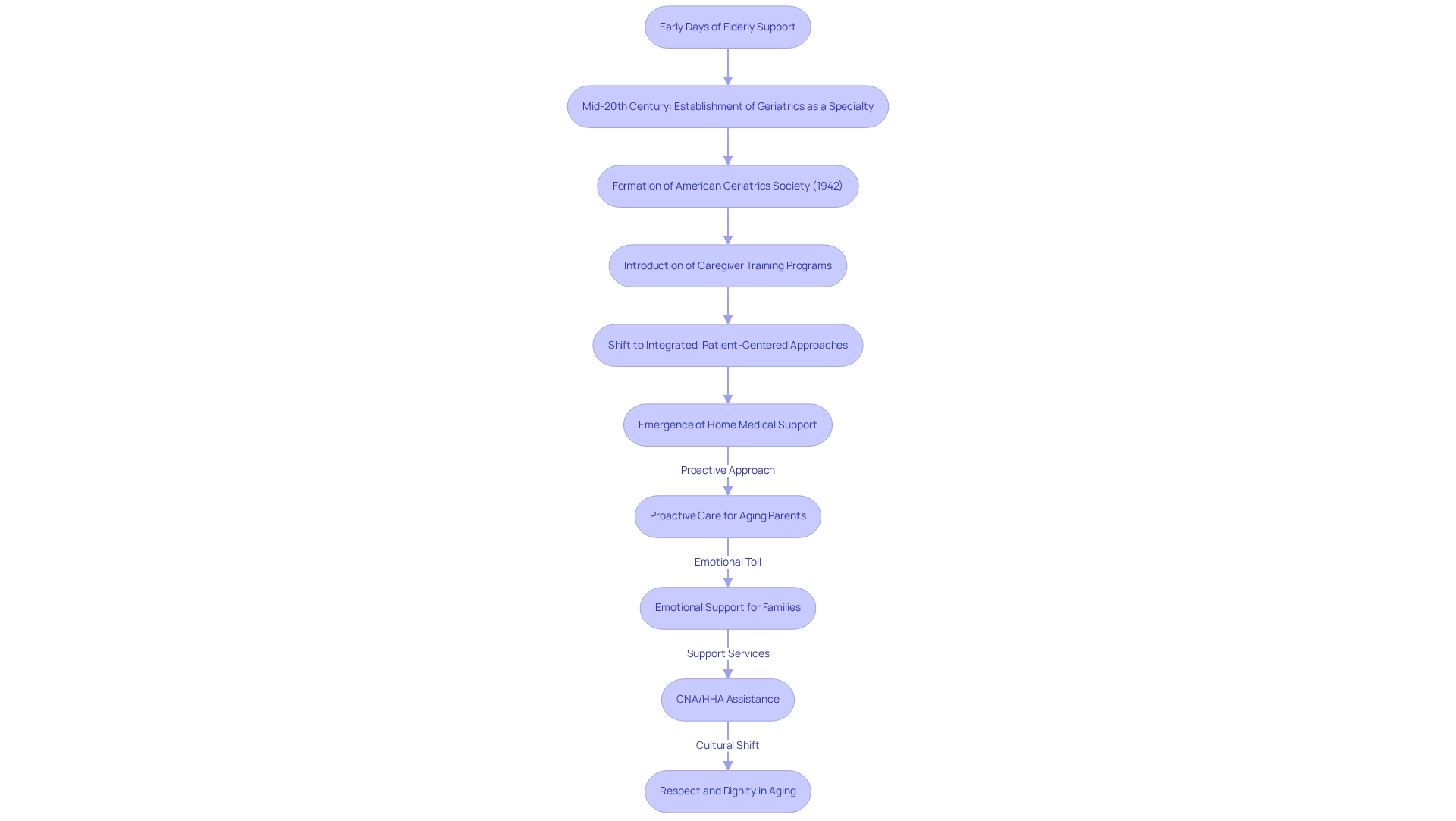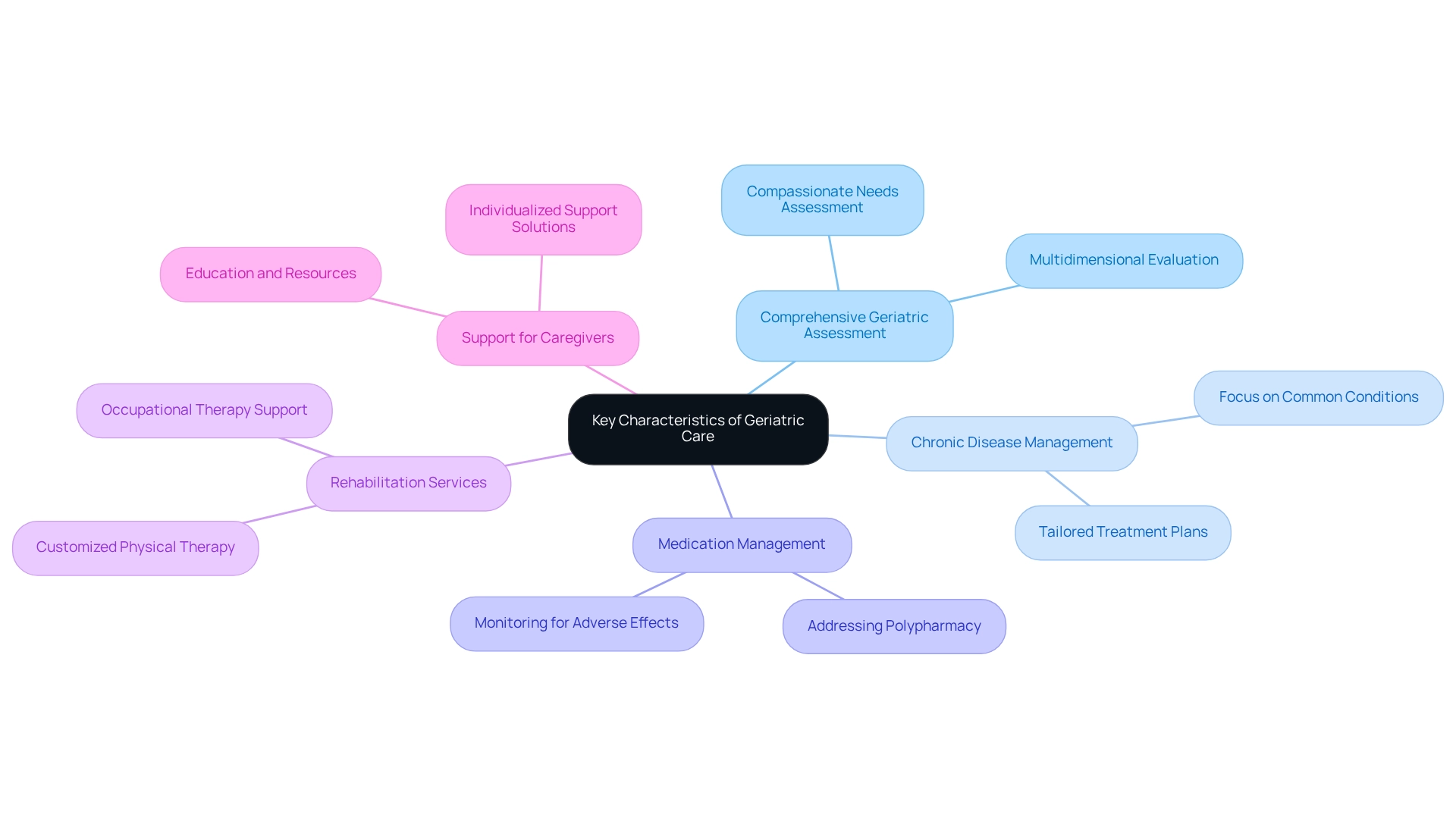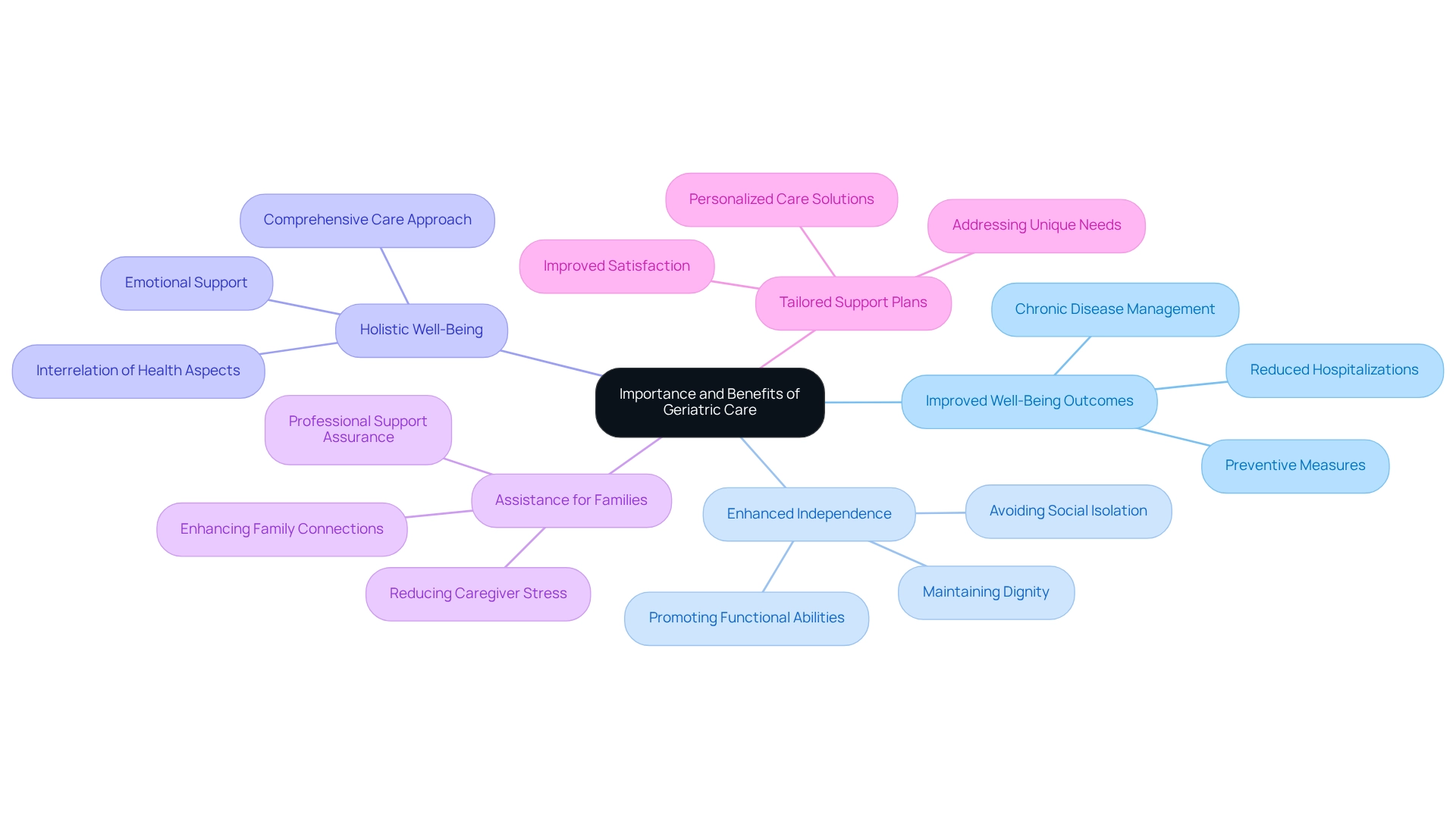Overview
Geriatric care is a specialized field of healthcare dedicated to meeting the unique medical, psychological, and social needs of older adults. By focusing on these essential aspects, we can significantly enhance their quality of life. This care is vital, as it addresses the concerns and feelings of our aging population.
The article highlights the importance of this compassionate approach, which encompasses preventive strategies, emotional support, and personalized assistance. Each element is crucial for tackling the challenges faced by older adults. In addition, these strategies foster a nurturing environment that encourages well-being and comfort.
As we delve deeper, it becomes clear that the comprehensive nature of geriatric care not only addresses medical needs but also provides emotional and social support. This holistic approach ensures that older adults feel understood and valued. Furthermore, by acknowledging their unique experiences, we can create a more supportive community.
Ultimately, we want to assure families that we are here for you. Your loved ones deserve the best care possible, and we are committed to providing a nurturing and empathetic environment. Together, we can enhance the quality of life for older adults, ensuring that their comfort is our priority.
Introduction
As our global population ages, there is a growing need for specialized healthcare services that cater to the unique needs of seniors. Geriatric care emerges as a compassionate response to this shift, offering a holistic approach that not only addresses the medical challenges faced by older adults but also nurtures their psychological and social well-being. With chronic conditions becoming increasingly prevalent among individuals aged 65 and older, the importance of personalized care solutions has never been more vital.
This article explores the significance of geriatric care, delving into its historical context, key characteristics, and the numerous benefits it provides in enhancing the quality of life for seniors. By highlighting innovative practices and the essential role of caregiver support, it becomes evident that effective geriatric care is crucial for fostering independence, dignity, and overall well-being in our aging society.
We understand the concerns that come with aging, and we are here to assure you that personalized, compassionate care is available. Together, we can navigate this journey, ensuring that every senior receives the support they deserve.
Defining Geriatric Care: Scope and Significance
Geriatric support, which encompasses what is geriatric, is a specialized field of healthcare that addresses the unique needs of older adults by focusing on a comprehensive approach to managing their medical, psychological, and social challenges. This kind of assistance is vital for improving the quality of life for seniors, especially as the aging population continues to grow. In 2025, the demand for geriatric assistance is projected to rise significantly, driven by a growing number of individuals aged 65 and older, who often face chronic conditions that require customized healthcare services.
The holistic aspect of geriatric support goes beyond simply addressing illnesses; it highlights preventive strategies, lifestyle modifications, and strong support systems for caregivers. Research indicates that one in three adults aged 50-80 report feelings of isolation, with 5% experiencing loneliness frequently. This emphasizes the essential requirement for emotional support within home environments, which can be effectively tackled through comprehensive geriatric programs like those provided by Best Care Nurses Registry. Their customized support options ensure that elderly individuals obtain the emotional comfort and companionship they need, improving their overall well-being.
Additionally, recognizing early warning signs to prevent crises is a vital aspect of geriatric care that can significantly improve outcomes for older adults. The crucial role of CNA/HHA assistance in enhancing the health and quality of life for older adults cannot be overstated. These services provide not only medical aid but also support with daily living tasks, ensuring that older adults maintain their independence and dignity.
Case studies show that home assistance options, like those offered by Best Care Nurses Registry, are not only more economical than institutional support but also greatly enhance the quality of life for seniors. For instance, the financial viability of home assistance services has attracted private equity interest, highlighting the sector’s long-term potential as both a service and investment opportunity. Successful geriatric support programs have demonstrated the ability to enhance independence among older adults, enabling them to preserve their dignity and quality of life.
Specialists in geriatric support advocate for a holistic approach, emphasizing that effective aging involves addressing the physical, emotional, and social dimensions of health. As Leon Trotsky aptly noted, “Old age is the most unexpected of all things that happen to a man.” As the landscape of healthcare transforms, what is geriatric support becomes increasingly evident, establishing it as a crucial element of the healthcare system that guarantees older adults receive the compassionate and thorough assistance they deserve. Moreover, the assisted living sector is anticipated to expand, mirroring the rising demand for geriatric support services and the significance of adapting to the requirements of an aging population.
If you or someone dear requires tailored assistance solutions, we’re here for you. Reach out to Best Care Nurses Registry today to explore how we can support you.

Historical Context: The Evolution of Geriatric Care
The evolution of geriatric support has undergone a remarkable transformation over the past century. In the early days, elderly support was primarily the responsibility of family members or institutional settings, often lacking specialized medical attention. However, the mid-20th century marked a pivotal shift with the establishment of geriatrics as a distinct medical specialty, emphasizing what is geriatric and the unique health challenges faced by older adults. A significant milestone in this journey was the formation of the American Geriatrics Society in 1942, which played a crucial role in advocating for enhanced training and resources for healthcare providers. Notably, progress in caregiver education, including the introduction of a 4-day in-house ‘snoezelen’ training program, has led to improved support practices for the elderly.
As the years advanced, geriatric support evolved into a more integrated, multidisciplinary approach, highlighting patient-centered methods that respect the preferences and values of older adults. This shift has been supported by various initiatives aimed at enhancing the quality of assistance for seniors. Recent programs by the American Geriatrics Society focus on training healthcare professionals in geriatric-specific practices, ensuring that the care provided is both effective and compassionate. Home medical support has emerged as a crucial element of this evolution, offering a more affordable, convenient, and equally effective alternative to traditional hospital or nursing home services. Services provided by Best Care Nurses Registry exemplify this shift, addressing safety concerns, providing companionship, and offering personalized support tailored to the unique needs of seniors.
The emotional toll on family members caring for aging relatives can be significant, often leading to stress and anxiety. Understanding that a professional caregiver is delivering quality assistance can ease these worries, allowing families to focus on their own obligations and well-being. Historical case studies demonstrate the effectiveness of proactive approaches, such as the study titled ‘Proactive Assistance for Aging Parents,’ which shows that early involvement with home support can prevent crises like falls or cognitive decline. This ultimately results in improved well-being and decreased medical expenses. The crucial function of CNA/HHA assistance in enhancing seniors’ well-being and quality of life cannot be overstated; these supports not only aid with daily living tasks but also provide emotional backing, helping to reduce feelings of loneliness and isolation.
As Walt Disney wisely noted, ‘Growing old is mandatory, but growing up is optional,’ highlighting the importance of embracing the aging journey with dignity and respect. Overall, the historical trajectory of geriatric support reflects a growing recognition of what is geriatric, which underscores the need for specialized attention to the elderly and fosters a culture of respect and dignity that continues to shape the field today. If you or someone dear could benefit from customized home wellness assistance, we’re here for you. Contact Best Care Nurses Registry at (888) 203-2529 to discuss your needs and arrange a consultation.

Key Characteristics of Geriatric Care: Services and Approaches
Geriatric care is characterized by its thorough and personalized approach to treatment, essential for enhancing the well-being and quality of life of our beloved seniors. We understand the unique challenges they face, and we are here to help.
- Comprehensive Geriatric Assessment (CGA): This multidimensional evaluation assesses the medical, psychological, and functional capabilities of older adults, ensuring that their unique needs are met with compassion.
- Chronic Disease Management: We focus on overseeing conditions like diabetes, hypertension, and arthritis, tailoring treatment plans to suit the elderly and their specific medical challenges.
- Medication Management: Our approach addresses polypharmacy, ensuring that medications are prescribed and monitored effectively to minimize adverse effects, which is vital for maintaining the health of elderly individuals.
- Rehabilitation Services: We offer customized physical and occupational therapy to assist older adults in regaining independence after illness or injury, enhancing their overall well-being.
- Support for Caregivers: We recognize the essential role family members play in supporting older adults. We provide education and resources, offering individualized support solutions that reduce stress and guarantee safety for seniors.
These characteristics highlight what is geriatric, demonstrating the necessity of a specialized approach to meet the complex needs of the aging population. We emphasize the importance of CNA/HHA services in providing essential support and companionship, which mitigates risks of isolation and enhances the overall quality of life. Remember, we’re here for you, and your comfort is our priority.

Importance and Benefits of Geriatric Care: Enhancing Quality of Life
Geriatric support plays a crucial role in enhancing the quality of life for older adults through several key benefits:
-
Improved Well-Being Outcomes: By emphasizing preventive measures and early interventions, geriatric support effectively manages chronic diseases, leading to fewer hospitalizations and better overall wellness. Research suggests that organized assistance among medical practitioners greatly enhances wellness results for older adults, guaranteeing thorough support customized to their varied requirements. Without CNA/HHA caregiver support, elderly individuals may face declines in well-being, as chronic conditions can deteriorate without appropriate monitoring and help. This is where CNA/HHA caregiver assistance becomes vital, as they offer the necessary medical oversight and support that can prevent wellness declines and address new concerns quickly.
-
Enhanced Independence: Geriatric support empowers older adults to maintain their autonomy by promoting functional abilities and providing crucial aid. This approach not only fosters autonomy but also enhances the overall well-being of older adults, allowing them to engage more fully in their daily lives. Customized caregiver services from Best Care Nurses Registry guarantee that elderly individuals obtain the support they require while maintaining their dignity and autonomy, avoiding problems like social isolation and inadequate nutrition.
-
Holistic Well-Being: Acknowledging the interrelation of physical, mental, and emotional health, geriatric support tackles all facets of well-being. This comprehensive method guarantees that older adults obtain support that fosters their whole self, leading to a more satisfying life. Emotional assistance from caregivers can reduce feelings of isolation and sadness, which are prevalent among the elderly, further highlighting the significance of having a caregiver available.
-
Assistance for Families: Geriatric support lessens the strain on family caregivers, allowing them to enjoy quality time with their loved ones instead of being swamped by caregiving responsibilities. This support is vital for maintaining family connections and reducing stress among caregivers. Understanding that a professional caregiver from Best Care Nurses Registry is delivering quality support can greatly alleviate anxiety for family members, enabling them to concentrate on their own responsibilities.
-
Tailored Support Plans: Each senior benefits from a personalized support plan that addresses their unique needs, preferences, and goals. This customization guarantees that support is not only pertinent but also efficient, resulting in enhanced wellness outcomes and increased satisfaction. Best Care Nurses Registry emphasizes the importance of creating tailored home health care solutions, ensuring that every client receives the attention and care they deserve. These benefits highlight what is geriatric care and its essential role in fostering healthier, more fulfilling lives for older adults, ultimately enhancing their independence and quality of life. To learn more about how Best Care Nurses Registry can assist you or your loved ones, call (888) 203-2529 today.

Conclusion
Geriatric care is at the heart of addressing the intricate needs of our aging population, offering a specialized and holistic approach that truly enhances the quality of life for seniors. This comprehensive care model not only manages medical conditions but also prioritizes psychological and social well-being, ensuring that older adults receive the emotional support they deeply need. As the demand for personalized care solutions continues to grow, the significance of geriatric care becomes increasingly clear, particularly in its ability to nurture independence and dignity among seniors.
The evolution of geriatric care reflects a growing awareness of the unique challenges faced by older adults. We are transitioning from traditional family or institutional care to a more integrated, multidisciplinary approach that truly meets their needs. Key characteristics of geriatric care—such as thorough assessments, chronic disease management, and tailored support for caregivers—underscore the necessity for specialized services that cater to the diverse needs of this demographic. These vital elements help prevent health declines and enhance the overall well-being of seniors, reinforcing the importance of caregiver support in their daily lives.
Ultimately, effective geriatric care not only improves health outcomes and promotes independence but also eases the burden on family caregivers, allowing for meaningful connections and reducing stress. By prioritizing personalized care plans and holistic well-being, geriatric care ensures that older adults can navigate the aging process with dignity and respect. The future of healthcare must continue to prioritize these compassionate, tailored solutions, ensuring that every senior receives the comprehensive support they deserve. We’re here for you, and your comfort is our priority.
Frequently Asked Questions
What is geriatric support?
Geriatric support is a specialized field of healthcare that addresses the unique needs of older adults by focusing on a comprehensive approach to managing their medical, psychological, and social challenges.
Why is geriatric support important?
Geriatric support is vital for improving the quality of life for seniors, particularly as the aging population grows, with an increasing number of individuals aged 65 and older facing chronic conditions that require customized healthcare services.
What are the projected trends for geriatric assistance in the near future?
By 2025, the demand for geriatric assistance is projected to rise significantly due to the growing number of older adults who often require specialized healthcare services.
How does geriatric support address emotional needs?
Geriatric support emphasizes the importance of emotional support within home environments, as research shows that many adults aged 50-80 report feelings of isolation. Comprehensive geriatric programs can provide the emotional comfort and companionship needed to improve overall well-being.
What role does CNA/HHA assistance play in geriatric care?
CNA (Certified Nursing Assistant) and HHA (Home Health Aide) assistance are crucial in enhancing the health and quality of life for older adults by providing medical aid and support with daily living tasks, helping them maintain independence and dignity.
How do home assistance options compare to institutional support?
Home assistance options are generally more economical than institutional support and have been shown to significantly enhance the quality of life for seniors, thus attracting private equity interest in the sector.
What is the holistic approach to geriatric support?
The holistic approach to geriatric support involves addressing the physical, emotional, and social dimensions of health, ensuring that older adults receive comprehensive care that promotes their overall well-being.
What does the future hold for the assisted living sector?
The assisted living sector is expected to expand in response to the rising demand for geriatric support services, highlighting the importance of adapting to the needs of an aging population.
How can I find tailored assistance solutions for elderly individuals?
You can reach out to Best Care Nurses Registry to explore tailored assistance solutions designed to support the needs of older adults.











